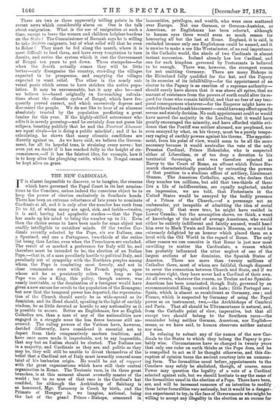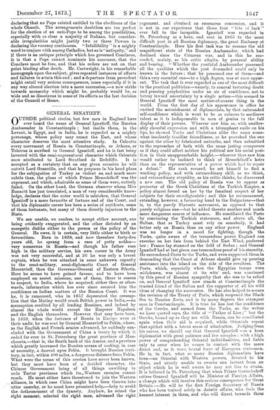THE NEW CARDINALS.
TT is almost impossible to discover, or to imagine, the reasons which have governed the Papal Court in its last nomina- tions to the Conclave, unless indeed the conscious object be to keep the power of election exclusively in Southern hands. There has been an extreme reluctance of late years to nominate Cardinals at all, and it is only after the number has sunk from 70 to 42, of whom many are aged, sick, and feeble—twelve, it is said, having had apoplectic strokes —that the Pope has made up his mind to bring the number up to 54. Even then the choice seems to have been made for some object not readily intelligible to outsiders' minds. Of the twelve Car- dinals recently selected by the Pope, six are Italians, one a Spaniard, and one a Portuguese, two-thirds of the entire list being thus Latins, even when the Frenchmen are excluded. The result of so marked a preference for Italy will be, and therefore must be intended to be, the election of an Italian Pope,—that is, of a man peculiarly hostile to political Italy, and peculiarly out of sympathy with the Northern peoples among whom the Pope is combating most fiercely, and not in close communion even with the French people, upon whose aid he so persistently relies. So long as the Pope was also a King, this policy, though narrow, was nearly inevitable, as the domination of a foreigner would have given a new excuse for revolt to the population of the Romagna; but now that the temporal power has departed, the representa- tion of the Church should surely be as wide-spread as its dominion, and its Head should, speaking in the light of earthly wisdom, be as little devoted or hostile to any nationality as it is possible to secure. Better an Englishman, few as English Catholics are, than a man of any of the nationalities now engaged in a struggle none the less fierce because still un- avowed. The ruling powers of the Vatican have, however, decided differently, have considered it essential not to depart from their comparatively modern tradition, and have once more made it improbable, not to say impossible, that any but an Italian should be elected. The Italians are in a majority, and Cardinals as they are, and politic as they may be, they will still be unable to divest themselves of the belief that a Cardinal not of Italy must inwardly conceal some taint of his barbarian origin. He would be out of rapport with the great organisations which have still their central organisation in Rome. The Teutonic race, in its three great branches, is at this moment almost avowedly master of the world ; but to no man of that race is the Cardinal's hat confided, for although the Archbishop of Salzburg is so honoured, Mgr. Tarmoczy is Czech by birth, and the Primate of Hungary is, we imagine, national, being the last of the grand Prince - Bishops, armoured in immunities, privileges, and wealth, who were once scattered over Europe. Not one German, or German-Austrian, or American, or Englishman has been selected, although to human eyes there would seem so much reason for honouring all but the last at Rome. England, it is said, is excluded because only one Englishman could be named, and it is unwise to make a see like Westminster, of no real importance in the Catholic world, the abode of two Cardinals in almost instant succession. Ireland already has her Cardinal, and one for each kingdom governed by Protestants is believed to be enough. There was, however, the strongest reason for not omitting Germany. There are many Bishops in the Rhineland fully qualified for the hat, and the Papacy in its exercise of its infallibility—for the appointment of an elector to the Papacy is an exertion of a supreme authority— should surely have shown that it was above all spites, that no amount of resistance from the powers of earth could alter its re- gard for those who remain faithful, and that no fear of any tem- poral consequences whatever—for the Emperor might have re- sented the refusal to ask his consent—could have any effectupon its serene and stately decision. No such appointment could or would have moved the majority in the Landtag, but it would have greatly encouraged the minority, and have afforded visible evi- dence that the Pontiff was neither alarmed, nor perplexed, nor even annoyed by what, on his theory, must be a purely tempo- rary raging of earthly powers against his throne. The appoint- ment, from his point of view, would seem to be all the more necessary because it would neutralise the vote of the only Prussian Cardinal, Prince Hohenlohe, who is suspected either of Liberalism, or of too deep a devotion to his territorial Sovereign, and was therefore rejected as Envoy to the Court of Rome, an affront which Prince Bis- marck characteristically punished by entrusting the powers of that position to a studious officer of artillery, Lieutenant Stumm. The American Catholics, again, who declare that they number ten millions, but add that two-thirds of these live a life of indifferentism, are equally neglected, under an impression, we are told, that Protestants in the United States would be annoyed by the bodily presence of a Prince of the Church,—of a personage not an ambassador, yet incapable of admitting the idea of social equality. If that were true, he might have resided in Lower Canada; but the assumption shows, we think, a want of knowledge of the mind of average Americans, who would either be entirely indifferent and faintly amused, would hand him over to Mark Twain and Barnum's Museum, or would be extremely delighted by an honour which placed them on a level with the Old World in the regard of Rome. The only other reason we can conceive is that Rome is just now most unwilling to scatter the Cardinalate, a reason which has probably influenced the utter neglect of one of the largest sections of her dominion, the Spanish States of America. There are more than twenty millions of Catholics there, most of whom are faithful, though disposed to sever the connection between Church and State, and if we remember right, they have never had a Cardinal of their own. At all events, whatever the reason no Teuton and no Spanish- American has been nominated, though Italy, governed by an excommunicated King, received six hats ; little Portugal one ; Spain, which is almost as recalcitrant as Germany, one ; and France, which is suspected by Germany of using the Papal power as an instrument, two —the Archbishops of Cambrai and Paris. That all should be Ultramontanes is natural, and, from the Catholic point of view, imperative, but that all except two should belong to the Southern races—the remainder being neither German, American, nor English— seems, as we have said, to human observers neither natural nor wise.
In refusing to submit any of the names of the new Car- dinals to the States to which they belong the Papacy is pro- bably wise. Circumstances have so changed in twenty years that only one ruler on earth thinks as the Pope does, and he is compelled to act as if he thought otherwise, and this dis- ruption of opinion tarns the ancient courtesy into an unmean- ing form. The formalities usual before,,,appointments to the Conclave may safely be abolished, though, of course, some Power may question the legality of a vote of a Cardinal selected against rule, but we should hesitate to say the same of the formalities usual in the election of a Pope. There have been, are, and will be incessant rumours of an intention to modify these latter formslities very seriously, but it would be a danger-, ous experiment to try, in the face of Governments who might be willing to accept any illegality in the election as an excuse for declaring that no Pope existed entitled to the obedience of the whole Church. The arrangements doubtless are too perfect for the election of an anti-Pope to be among the possibilities, especially with so clear a majority of Italians, but consider- able irregularities might justify two or three Powers in declaring the vacancy continuous. " Infallibility " is a mighty word to conjure with among Catholics, but so is "antiquity," and if there is an antique principle which has governed Conclaves, it is that a Pope cannot nominate his successor, that the Conclave must be free, and that his orders are not on that point binding after death. Mr. Cartwright, in his remarkable monograph upon the subject, gives repeated instances of efforts and failures to attain this end ; and a departure from precedent might entail very serious consequences, more especially if it in any way altered election into a mere succession,—a new stride towards monarchy which might be, probably would be, as wide and as disastrous in some of its effects as the last decision of the Council of Rome.



































 Previous page
Previous page